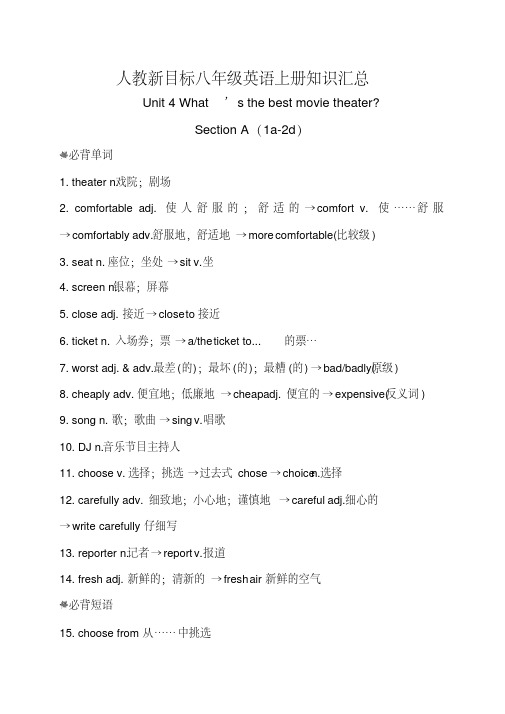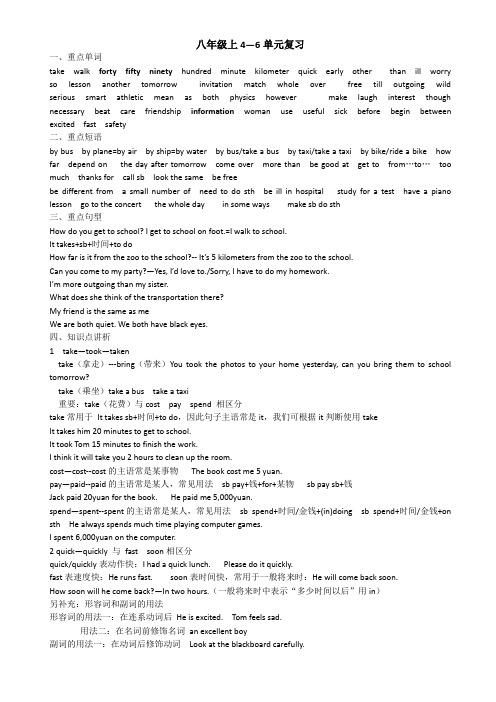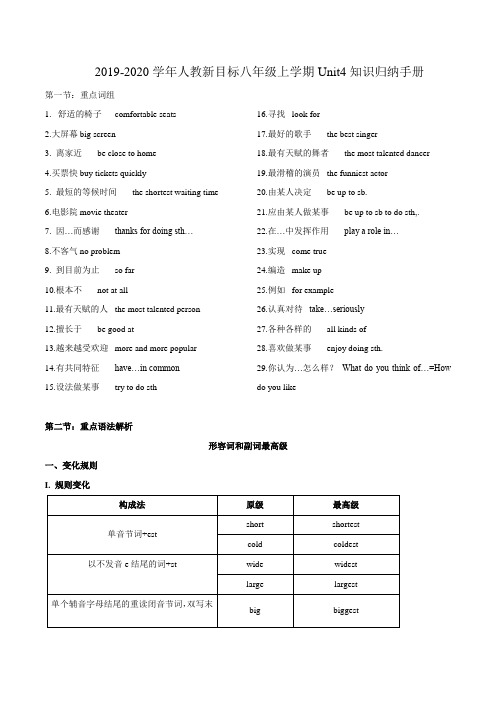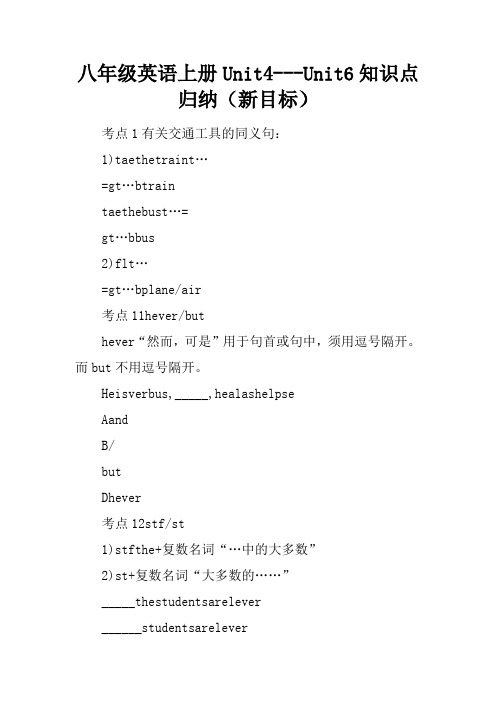新目标英语八年级上Units 4~6背景知识介绍
新目标八年级英语上册Unit4复习资料大全(20200903105106)

人教新目标八年级英语上册知识汇总Unit 4 What’s the best movie theater?Section A(1a-2d)必背单词1. theater n.戏院;剧场2. comfortable adj. 使人舒服的;舒适的→comfort v. 使……舒服→comfortably adv.舒服地,舒适地→more comfortable(比较级)3. seat n. 座位;坐处→sit v.坐4. screen n.银幕;屏幕5. close adj. 接近→close to接近的票6. ticket n. 入场券;票→a/the ticket to...……7. worst adj. & adv.最差(的);最坏(的);最糟(的)→bad/badly(原级)8. cheaply adv. 便宜地;低廉地→cheap adj. 便宜的→expensive(反义词)9. song n. 歌;歌曲→sing v.唱歌10. DJ n.音乐节目主持人11. choose v. 选择;挑选→过去式chose→choice n.选择12. carefully adv. 细致地;小心地;谨慎地→careful adj.细心的→write carefully仔细写13. reporter n.记者→report v.报道14. fresh adj. 新鲜的;清新的→fresh air新鲜的空气必背短语15. choose from 从……中挑选16. so far 到目前为止;迄今为止17. no problem 没什么,别客气必背句子18. What’s the best movie theater to go to?可去的最好的电影院是什么?19. How do you like it so far?迄今为止,你觉得它怎么样?20. Why do you think so?你为什么这样认为?Section A(Grammar Focus-3c)必背单词1. worse adj. & adv.更差(的);更坏(的);更糟(的)→原级bad/badly2. service n. 接待;服务→the best service in town镇上最好的服务→serve v.服务→serve sb.服务某人3. pretty adv. 相当;十分;很adj.漂亮的4. menu n. 菜单5. act v. 扮演n. 表演者→actor男演员/actress女演员6. meal n. 早(或午、晚)餐;一餐所吃的食物必背短语7. not...at all 一点也不→ not at all用来回答Would you mind doing sth.?你介意做某事吗?8. in town 在城镇9. think of 认为;考虑必背句子10. Which is the worst clothes store in town?镇上最差的衣服店是哪家?11. What do you think of 970 AM?你觉得970AM怎么样?Section B(1a-1e)必背单词1. creative adj. 有创造力的;创造性的→more creative 更有创造力的→the most creative 最有创造力的→create v.创建2. performer n.表演者;演员→perform v.表演→performance n.表演Section B(2a-2e)必背单词1. talent n. 天资;天赋→have talent for sth. 在某方面有天赋→talented adj.有才能的→be talented in 在某方面有天赋2. magician n. 魔术师→magic n.魔术3. beautifully adv. 美好地;漂亮地→beautiful adj.漂亮的4. role n. 作用;职能;角色→play a role in sth. 在某方面起作用→play an important role in sth. 在某方面起重要作用5. winner n. 获胜者;优胜者→win v.赢→won(过去式)6. prize n. 奖;奖品;奖金7. everybody pron. 每人;人人;所有人→同义词everyone8. example n. 实例;范例→for example 例如9. poor adj. 贫穷的;清贫的→反义词rich adj.富有的10. seriously adv. 严肃地;严重地;认真地→serious adj.严肃的11. give v. 提供;给→give sb. sth.= give sth. to sb.给某人某物必背短语12. around the world 世界各地13. have...in common 有相同特征;(想法、兴趣等方面)相同14. all kinds of 各种类型的;各种各样的15. be up to 是……的职责;由……决定16. make up 编造(故事、谎言等)17. for example 例如18. take...seriously 认真对待……19. come true 实现必背句子20.It’s always interesting to watch other people show their talents.看他人展示他们的才艺总是有趣的。
八年级英语新目标上册Unit4 知识点总结

八年级英语新目标上册 Unit4 知识点总结1. 词汇1.1 动词短语•take care of:照顾,关心•look after:照料,照顾•grow up:长大•get along with:与…相处•be good at:擅长•be interested in:对…感兴趣•be afraid of:害怕•be angry with:生气,对…生气•be worried about:担心,忧虑1.2 名词短语•rice fields:稻田•a pair of:一双,一对•African elephants:非洲象•part-time job:兼职工作•text messages:短信•the poorest places:最贫困的地方•a piece of:一片,一块1.3 形容词•upset:心烦的,沮丧的•bored:无聊的•energetic:精力充沛的•miserable:痛苦的,不幸的•creative:有创造力的•talented:有才华的•respectful:尊敬的•confident:自信的1.4 副词•carefully:小心地•easily:容易地•patiently:耐心地•hardly:几乎不•mostly:主要地•surely:无疑地•exactly:确切地•definitely:肯定地2. 语法2.1. 一般现在时一般现在时表示经常性、习惯性或现有状况。
•肯定句结构:主语 + 动词原形/第三人称单数动词变化 (he/she/it) •否定句结构:主语 + is/are/am not + 动词原形•疑问句结构:is/are/am + 主语 + 动词原形?2.2. 物主代词物主代词用来表示所属关系或拥有关系,有主格形式和宾格形式。
•主格形式:my,your,his,her,its,our,their•宾格形式:mine,yours,his,hers,its,ours,theirs2.3. 情态动词情态动词用来表示可能性、能力、许可、请求、建议等。
英语八上第四单元知识点

英语八上第四单元知识点(原创实用版)目录1.英语八上第四单元概述2.单元知识点详解2.1 词汇2.2 语法2.3 听力技巧2.4 阅读技巧2.5 写作技巧2.6 口语技巧正文【英语八上第四单元概述】英语八上第四单元是一个知识点丰富、实用性强的单元,本单元的主题是“人与自然”,旨在让学生了解自然环境与人类生活的关系,提高学生保护环境的意识。
本单元的知识点主要包括词汇、语法、听力技巧、阅读技巧、写作技巧和口语技巧。
【单元知识点详解】【2.1 词汇】本单元的词汇包括:environment, nature, pollution, protection, resources, conservation 等。
这些词汇与环境保护和资源利用密切相关,要求学生熟练掌握并能运用到实际情境中。
【2.2 语法】本单元的语法重点是情态动词的用法。
情态动词用来表示说话人的态度、建议、请求或可能性,包括 can, may, will, shall, should, could, might 等。
学生需要掌握这些情态动词的含义和用法,以及它们与其他动词的搭配。
【2.3 听力技巧】本单元的听力技巧是听懂关于环保和资源利用的英语对话,并能准确捕捉关键信息。
学生需要提高听力水平,培养在实际交际中运用英语的能力。
【2.4 阅读技巧】本单元的阅读技巧是阅读关于环保和资源利用的英语文章,并能正确理解文章的主旨和细节。
学生需要学会使用略读、寻读等阅读策略,提高阅读效率。
【2.5 写作技巧】本单元的写作技巧是写作关于环保和资源利用的英语作文,要求学生能够清晰、有条理地表达自己的观点和想法。
学生需要学会组织篇章,使用恰当的词汇和句型。
【2.6 口语技巧】本单元的口语技巧是谈论关于环保和资源利用的话题,要求学生能够流利、准确地表达自己的观点和想法。
学生需要学会运用恰当的语言表达方式,提高口语交际能力。
八年级上人教版Unit 4-6知识点总结

Unit 4 How do you get to school?一、交通方式的询问: How do you get to school?二、对于交通方式的回答:注意点:并不是所有都用take, 也并不是所有都用by,注意四个方面① 步行特殊的: walk = go ..on foot ,② By car , by bike = drive a / my car , ride a / my bike③ By +交通工具无冠词,但 ride a bike/ drive a car/ take a bus 等必须有冠词a/ the.④ 除了介词by +交通工具外,还可以用on/ in +交通工具,on a bus, in a car , on my bike ….三、对于路程多久的提问: How long does it take ?回答:It takes me 30 minutes.(重点句型)重/难点辨析:花费 take , spend, pay ,costIt takes sb time/ money to do sth. (有时态变化,过去式took,)Sb spend time/ money on sth/ in doing sth.Sb pay money for sth物 cost sb time/ money.四、对于路程有多远的提问:How far is it from his home to school?回答: It’s about 10 kilometers (away) from his home to school.重点、难点辨析: be far from, away from, from ..to .far from, 离…远 My school is far from my home.具体路程+away from, My school is 10 kilometers away from my home.From…to, 从…到…It’s 10 kilometers (away) f rom my school to my home.A +be +路程距离+B, My school is 10 kilometers from my home.五、宾语从句: 疑问语序变为陈述语序(引导词+主语+谓语)(重、难点)Thomas wants to know where Nina lives.Thomas wants to know how long it takes to get to school .Thomas wants to know how far from school she lives.六、语法讲解——how 引导的特殊疑问句1、how引导的特殊疑问句提问交通方式。
八年级上4-6讲解

八年级上4—6单元复习一、重点单词take walk forty fifty ninety hundred minute kilometer quick early other than ill worry so lesson another tomorrow invitation match whole over free till outgoing wild serious smart athletic mean as both physics however make laugh interest though necessary beat care friendship information woman use useful sick before begin between excited fast safety二、重点短语by bus by plane=by air by ship=by water by bus/take a bus by taxi/take a taxi by bike/ride a bike how far depend on the day after tomorrow come over more than be good at get to from…to…too much thanks for call sb look the same be freebe different from a small number of need to do sth be ill in hospital study for a test have a piano lesson go to the concert the whole day in some ways make sb do sth三、重点句型How do you get to school? I get to school on foot.=I walk to school.It takes+sb+时间+to doHow far is it from the zoo to the school?-- It’s 5 kilometers from the zoo to the school.Can you come to my party?—Yes, I’d love to./Sorry, I have to do my homework.I’m more outgoing than my sister.What does she think of the transportation there?My friend is the same as meWe are both quiet. We both have black eyes.四、知识点讲析1 take—took—takentake(拿走)---bring(带来)You took the photos to your home yesterday, can you bring them to school tomorrow?take(乘坐)take a bus take a taxi重要:take(花费)与cost pay spend 相区分take常用于It takes sb+时间+to do,因此句子主语常是it,我们可根据it判断使用takeIt takes him 20 minutes to get to school.It took Tom 15 minutes to finish the work.I think it will take you 2 hours to clean up the room.cost—cost--cost的主语常是某事物The book cost me 5 yuan.pay—paid--paid的主语常是某人,常见用法sb pay+钱+for+某物sb pay sb+钱Jack paid 20yuan for the book. He paid me 5,000yuan.spend—spent--spent的主语常是某人,常见用法sb spend+时间/金钱+(in)doing sb spend+时间/金钱+on sth He always spends much time playing computer games.I spent 6,000yuan on the computer.2 quick—quickly 与fast soon相区分quick/quickly表动作快:I had a quick lunch. Please do it quickly.fast表速度快:He runs fast. soon表时间快,常用于一般将来时:He will come back soon.How soon will he come back?—In two hours.(一般将来时中表示“多少时间以后”用in)另补充:形容词和副词的用法形容词的用法一:在连系动词后He is excited. Tom feels sad.用法二:在名词前修饰名词an excellent boy副词的用法一:在动词后修饰动词Look at the blackboard carefully.用法二:在形容词前修饰形容词very good quite noisy3 other及其变化形式在初中教材中多次出现,而且它的变化形式很多,有以下几种:the other, others, the others, another 等。
八年级上册 Units 4~6 核心知识梳理

八年级上册Units 4~6 核心知识梳理(学习版)编制人:__________________审核人:__________________审批人:__________________编制学校:__________________编制时间:____年____月____日序言下载提示:该文档是本店铺精心编制而成的,希望大家下载后,能够帮助大家解决实际问题。
文档下载后可定制修改,请根据实际需要进行调整和使用,谢谢!并且,本店铺为大家提供各种类型的经典范文,如英语单词、英语语法、英语听力、英语知识点、语文知识点、文言文、数学公式、数学知识点、作文大全、其他资料等等,想了解不同范文格式和写法,敬请关注!Download tips: This document is carefully compiled by this editor.I hope that after you download it, it can help you solve practical problems. The document can be customized and modified after downloading, please adjust and use it according to actual needs, thank you!In addition, this shop provides various types of classic sample essays, such as English words, English grammar, English listening, English knowledge points, Chinese knowledge points, classical Chinese, mathematical formulas, mathematics knowledge points, composition books, other materials, etc. Learn about the different formats and writing styles of sample essays, so stay tuned!八年级上册Units 4~6 核心知识梳理核心知识梳理【重点单词】1.戏场;剧院(n.)________2.座位;坐处(如椅子等)(n.)________3.银幕;屏幕(n.)________4.票;入场券(n.)________5.歌;歌曲(n.)________6.新鲜的;清新的(adj.)________7.接待;服务(n.)________8.相当;十分;很(adv.) 漂亮的(adj.)________ 9.菜单(n.)________10.早(或午、晚)餐;一餐所吃的食物(n.)________ 11.魔术师(n.)________12.作用;职能;角色(n.)________13.奖;奖品;奖金(n.)________14.每人;人人;所有人(pron.)________15.实例;范例(n.)________16.新闻节目;新闻(n.)(不可数名词)________ 17.介意;对(某事)烦恼(v.)________18.计划;打算(v.&n.)________19.发生;出现(v.)________20.预料;期待(v.)________21.笑话;玩笑(n.)________22.动画片;卡通片(n.)________23.可能;可以(modal v.)________24.主要的;最重要的(adj.)________25.原因;理由(n.)________26.普通的;常见的(adj.)________27.愿意的;准备好的(adj.)________28.陆军;陆军部队(n.)________29.医生(n.)________30.工程师(n.)________31.飞行员(n.)________32.学院;大学;高等专科学校(n.)________ 33.药;医学(n.)________34.(综合性)大学;高等学府(n.)________ 35.伦敦________36.文章;论文(n.)________37.队;组(n.)________38.外国的(adj.)________39.承诺;诺言(n.) 许诺;承诺(v.)________ 40.身体的(adj.)________41.业余爱好(n.)________42.学校作业;功课(n.)________43.用颜料画;在……刷油漆(v.)________44.表示疑问;怀疑;提问;质询(v.)________45.关系;联系(n.)________【词形百变】fortable(adj.)使人舒服的;舒适的→________(adj.)不舒服的;不舒适的2.close(adj.)(在时间、空间上)接近→________(比较级)→________(最高级)3.bad(adj.)坏的;差的;糟糕的→________(比较级)→________(最高级)4.cheap(adj.)便宜的;廉价的→________(adv.)便宜地;低廉地5.choose(v.)选择;挑选→________(过去式)→________(过去分词)→________(现在分词)6.careful(adj.)细致的;小心的;谨慎的→________(adv.)细致地;小心地;谨慎地7.report(n.)报告;报道;成绩单(v.)报告;报道→________(n.)记者8.act(v.)扮演(n.)表演者→________(n.)演员→________(n.)女演员→________(n.)行动→________(n.)活动→________(复数)9.create(v.)创造→________(adj.)有创造力的;创造性的10.talent(n.)天资;天赋→________(adj.)有天赋的11.beautiful(adj.)美丽的;漂亮的→________(adv.)美好地;漂亮地→________(n.)美丽;美人12.poor(adj.)贫穷的;清贫的→________(比较级)→________(最高级)→________(反义词)(adj.)富有的13.serious(adj.)严肃的;严重的→________(adv.)严重地;严肃地;认真地14.give(v.)提供;给→________(过去式)→________(过去分词)→________(现在分词)15.stand(v.)忍受;站立→________(过去式/过去分词)16.educate(v.)教育→________(n.)教育→________(adj.)教育的;有教育意义的17.hope(v.&n.)希望→________(adj.)有希望的→________(adj.)绝望的;没有希望的18.discuss(v.)商量;讨论→________(n.)商量;讨论19.meaning(n.)意义;意思→________(adj.)有意义的;意味深长的→________(adj.)毫无意义的;意思不明确的20.culture(n.)文化;文明→________(adj.)文化的;文明的21.famous(adj.)著名的;出名的→________(近义词)(adj.)著名的;众所周知的22.appear(v.)出现→________(n.)出现,外貌;外观→________(反义词)(v.)消失23.become(v.)开始变得;变成→________(过去式)→________(过去分词)→________(现在分词)24.success(n.)成功→________(v.)成功→________(adj.)获得成功的;有成就的→________(adv.)成功地25.lose(v.)失去;丢失→________(过去式/过去分词)→________(现在分词)26.simple(adj.)简单的;易做的→________(adv.)简单地;仅仅;只是27.drive(v.)开车;驾驶;驱使→________(过去式)→________(过去分词)→________(现在分词)→________(n.)驾驶员;司机28.send(v.)邮寄;发送→________(过去式/过去分词)29.begin(v.)开始→________(过去式)→________(过去分词)________(n.)开头;开端30.improve(v.)改进;改善→________(过去式/过去分词)→________(现在分词)→________(n.)改进;改善31.own(adj.&pron.)自己的;本人的→________(n.)所有者;物主32.person(n.)人→________(adj.)个人的;私人的【核心短语】1.靠近____________2.到目前为止;迄今为止____________3.有相同特征;(想法、兴趣等方面)相同____________ 4.各种类型的;各种各样的____________5.是……的职责;由……决定____________6.发挥作用;有影响____________7.编造(故事、谎言等)____________8.例如____________9.认真对待……____________10.查明;弄清____________11.准备好(做某事);愿意(做某事)____________ 12.装扮;乔装打扮____________13.代替;替换____________14.干得好____________15.长大;成熟;成长____________16.确信;对……有把握____________17.确保;查明____________18.能够做某事____________19.在……开始____________20.写下;记录下____________21.关于;与……有关系____________22.(尤指为消遣)学着做;开始做____________23.同意;赞成____________【连词成句】1.is,what,best,movie theater,the______________________________?2.it,the,closest,home,is,to______________________________.3.is,the,which,worst,clothes store______________________________?4.of,what,think,talk shows,do,you__________________________?5.do,you,expect,what,to,learn from,sitcoms ______________________________?6.going,am,computer science,to,study,I______________________________.7.when,what,you,want,to,do,be,you,grow up ______________________________?8.I,want,be,an,to,engineer______________________________.9.are,going,you,to,do,how,that______________________________?10.study,I,going,to,math,am,really,hard______________________________.【核心语法】1.形容词和副词的最高级2.一般将来时(be going to)3.动词不定式作宾语【话题写作】1.Your town你的城镇2.Entertainment娱乐3.Life goal人生目标1.Are you the ________(own) of this bike?2.The seat is so hard to sit on. It's so ________(comfortable).3.I think I should be allowed to make ________(choose) by myself.4.Without their help, we could not have done it so ________(success).5.Nothing is a waste if you have a ________(create) mind.6.The skirt is a little expensive. Could you please give me a ________(cheap) one?7.Boys and girls, watch ________(care) and try to find out something strange.8.Usually, shirts and ties ________(give) to fathers as gifts on Father's Day.9.Tong Liya is a famous ________(act) who ________(act)as a countrywoman in 1970s in a TV play series.10.He was ________(choose) not only because he was clever but he was hard­working.参考答案【核心知识梳理】重点单词1.theater2.seat3.screen4.ticket5.song6.fresh7.service8.pretty9.menu10.meal11.magician12.role13.prize14.everybody15.example16.news17.mind18.plan19.happen20.expect21.joke22.cartoon23.might24.mon27.ready28.army29.doctor30.engineer31.pilot32.college33.medicine34.university35.London36.article37.team38.foreign39.promise40.physical41.hobby42.schoolwork43.paint44.question45.relationship 词形百变1.uncomfortable2.closerclosest3.worseworst4.cheaply5.chosechosenchoosing6.carefully7.reporter8.actoractressactionactivityactivities9.creative10.talented11.beautifullybeauty12.poorerpoorestrich/wealthy13.seriously14.gavegivengiving15.stood 16.educationeducational17.hopefulhopeless18.discussion 19.meaningfulmeaningless20.cultural21.well­known22.appearancedisappear 23.becamebecomebecoming 24.succeedsuccessfulsuccessfully25.lostlosing 26.simply27.drovedrivendrivingdriver28.sent 29.beganbegunbeginning 30.improvedimprovingimprovement31.owner 32.personal核心短语1.close to2.so far3.have... in common4.all kinds of5.be up to6.play a role7.make up 8.for example9.take... seriously10.find out 11.be ready to12.dress up13.take sb.'s place 14.do a good job15.grow up16.be sure about 17.make sure18.be able to19.at the beginning of 20.write down21.have to do with22.take up 23.agree with连词成句1.What is the best movie theater2.It is the closest to home3.Which is the worst clothes store4.What do you think of talk shows5.What do you expect to learn from sitcoms 6.I am going to study computer science 7.What do you want to be when you grow up 8.I want to be an engineer9.How are you going to do that10.I am going to study math really hard词形百变练习1.owner2.uncomfortable3.choices4.successfully 5.creative6.cheaper7.carefully8.are given 9.actress; acts10.chosen。
英语八上第四单元知识点

英语八上第四单元知识点一、单元主题概述英语八上第四单元的主题是“旅行与探险”。
本单元通过讲述一段富有冒险精神的旅程,让学生在学习语言知识的同时,感受到探索未知世界的勇气与激情。
在学习过程中,学生们将接触到各种与旅行和探险相关的词汇和表达,进一步提高他们的英语实际运用能力。
二、重点词汇与短语1.旅行相关词汇:旅行、探险、目的地、行李、护照、签证、交通工具、预订、地图、指南针等。
2.地点词汇:机场、火车站、旅馆、景点、博物馆、餐厅、商店等。
3.实用短语:做好准备、规划行程、办理手续、兑换货币、问路、购物、拍照、预约等。
三、语法要点1.现在进行时:用于描述现阶段正在进行的动作,如“I"m traveling in Europe.”(我正在欧洲旅行。
)2.一般现在时:用于陈述事实或习惯,如“I travel abroad every year.”(我每年出国旅行。
)3.一般过去时:用于描述过去发生的动作,如“I traveled to Paris last year.”(我去年去了巴黎。
)4.情态动词:can、may、must、should等,用于表达能力、请求、建议等,如“Can you speak English?”(你会说英语吗?)四、实用句型与表达1.询问信息:What time does the train/bus leave?(火车/公交车什么时候发车?)2.提供帮助:Can I help you?(需要帮忙吗?)3.表达感谢:Thank you./You"re welcome./My pleasure.(谢谢./不客气./乐意效劳。
)4.描述行程:We"re going to visit the Eiffel Tower, the Louvre Museum, and the Champs-lysées.(我们要去参观埃菲尔铁塔、卢浮宫和香榭丽舍大道。
【人教版】新目标八年级英语上册:Unit4单元说课稿

【人教版】新目标八年级英语上册:Unit 4 单元说课稿一. 教材分析新目标八年级英语上册Unit 4主要围绕着“过去进行时”的语法知识点展开。
这一单元的话题是关于过去发生的事情,通过学习让学生能够运用过去进行时描述过去正在进行的动作。
教材通过丰富的生活情境,引导学生理解和运用过去进行时,提高他们的语言运用能力。
二. 学情分析学生在学习这一单元之前,已经掌握了基本的英语语法知识,对动词时态有了初步的了解。
但他们在运用过去进行时方面可能会遇到困难,因此需要通过实例和练习来加强理解和运用。
此外,学生需要提高听、说、读、写四项基本技能,特别是在口语表达和写作方面。
三. 说教学目标1.知识目标:让学生掌握过去进行时的构成、意义和用法,能够正确运用过去进行时描述过去正在进行的动作。
2.能力目标:提高学生的听、说、读、写能力,使他们能够在实际情境中运用过去进行时。
3.情感目标:激发学生学习英语的兴趣,培养他们积极向上的学习态度。
四. 说教学重难点1.重点:过去进行时的构成、意义和用法。
2.难点:如何运用过去进行时描述过去正在进行的动作,以及如何在实际情境中正确使用。
五. 说教学方法与手段1.采用任务型教学法,让学生在完成任务的过程中,自然地学习和运用过去进行时。
2.运用多媒体教学手段,如课件、视频等,为学生提供丰富的学习资源,提高他们的学习兴趣。
3.小组讨论和课堂展示,激发学生的合作意识和竞争意识。
六. 说教学过程1.导入:通过提问学生昨天做了什么,引导学生思考过去正在进行的动作,激发他们对过去进行时的兴趣。
2.呈现:通过课件展示过去进行时的结构,让学生初步了解过去进行时的概念。
3.讲解:详细讲解过去进行时的构成、意义和用法,并通过实例进行说明。
4.练习:设计不同类型的练习题,让学生在实际操作中掌握过去进行时的运用。
5.运用:学生进行小组讨论,让他们运用过去进行时描述过去发生的事情。
6.总结:对本节课的内容进行总结,强调过去进行时的关键点。
2019-2020学年人教新目标八年级上学期Unit4知识归纳手册

2019-2020学年人教新目标八年级上学期Unit4知识归纳手册第一节:重点词组1.舒适的椅子comfortable seats2.大屏幕 big screen3. 离家近be close to home4.买票快 buy tickets quickly5. 最短的等候时间the shortest waiting time6.电影院 movie theater7. 因…而感谢thanks for doing sth…8.不客气 no problem9. 到目前为止so far10.根本不not at all11.最有天赋的人the most talented person12.擅长于be good at13.越来越受欢迎more and more popular14.有共同特征have…in common15.设法做某事try to do sth 16.寻找look for17.最好的歌手the best singer18.最有天赋的舞者the most talented dancer19.最滑稽的演员the funniest actor20.由某人决定be up to sb.21.应由某人做某事be up to sb to do sth,.22.在…中发挥作用play a role in…23.实现come true24.编造make up25.例如for example26.认真对待take…seriously27.各种各样的all kinds of28.喜欢做某事enjoy doing sth.29.你认为…怎么样?What do you think of…=How do you like第二节:重点语法解析形容词和副词最高级一、变化规则I. 规则变化II. 不规则变化二、用法1 表示三者及以上人或物进行比较时用最高级,结构为“the + 最高级+in/of + 范围”。
e.g: 1. The picture is the best of all. 这幅画是所有画中最好的。
八年级英语上册Units4-6知识归纳

八年级英语上册Units4-6知识归纳八年级上册Units 4--6知识归纳一、词语辨析:1、arrive, get, reacharrive不及物动词,后面要跟in或at。
表示到达大城市或国家时要用in,而到达小城市、乡村、车站等小地方则用at。
如:We arrived in London last week. 我们上周到达伦敦。
The doctor arrived at the village at last. 医生终于到达了那个村子。
reach是"独行侠",是及物动词,后面从来不跟介词,直接跟宾语(地点名词)就行了。
如:When did you reaation? 你是什么时间到达车站的? He reached Nanjing a他是中午到达南京的。
get是不及物动词后面要接to再接地点名词,.当“到达”的地点是副词时,就不带它了。
如:Ann garm at six o‘clock. 安六点钟到达农场. I garlg. 我一大早就到这儿了.注意:如果不指明到达的地点就不能用get,而要用arrive.如:When I arrived, they weren‘当我到达时,他们不在那儿.2、sick, ill(1)都可译为“生病的”。
ill只在系动词后作表语:Hwas ill in bedls ill today.但sick既可作表语: Hwas sick / ill in bed. (作表语常是美国英语用法)也可作定语(即后接名词):Jane is taking ca(此处是定语,不可用ill. 原因见下文ill用法) (2)若ill作定语,译为“坏的,恶劣的”an ill person一个坏人作表语时也常译为“恶心的,想吐的”。
The boy always feels sick wavels by ca、other, aanother与和others 与都来源于other这个词。
八年级英语上unit4-6知识点归纳 Word 文档 (2)

Unit 7 How do you make a banana milk shake?【复习目标】●学会询问和描述一种食物的制作过程●学习询问和描述做一件事情的过程●能够依据指示语做事情●区分可数名词和不可数名词【语言目标】● How do you make a banana milk smoothie?First, peel the bananas and cut it up. then put the milk into the blender....● How many bananas do we need? We need three bananas.【语言结构】●祈使句/ 可数名词和不可数名词● How much / How many引导的特殊疑问句【重点词汇】● turn on, cut up, peel, pour, put, mix up,/ how much, how many, amount ● milk smoothie, yogurt watermelon, ingredient, sauce, popcorn● blender, t easpoon, cup,/ first, then, next● sandwich, lettuce, relish, turkey, bread【应掌握的词组】1. make a banana smoothie 制作香蕉混合饮料(思木西)2. peel the bananas 剥香蕉3. cut up the bananas切碎香蕉4. pour the milk in the blender 将牛奶倒入搅拌器5. turn on the blender 打开搅拌器电源6. put the yogurt in the blender将酸奶放入搅拌器7. turn off 关上,(turn on 打开)turn up旋大(灯火等),开大(煤气等)调高(声音等),turn down 把(灯火、电器等)关小一点8. how much cinnamon多少肉桂9. one teaspoon of cinnamon 一茶匙肉桂10. make fruit salad 制作水果沙拉11. two pieces of bread 两片面包12. mix it all up 将它们混合在一起14. turkey slices 火鸡肉片, a slice of bread一片面包13. takes turns doing sth,take turns to do sth.=do sth. in turns 轮流做某事15. slices of duck 烤鸭片16. roll pancake 卷上薄饼17. make faces 作鬼脸make friends with 与……交朋友make a noise吵闹, make mistakes犯错误,make the bed整理床铺make one’s way to往…走去,make room for给…腾出地方18. it’s easy to do sth. 做某事容易it’s hard (difficult) to do sth.做某事难,It’s necessary to do sth.做某事必要19. put sth, in order 将某些东西按顺序排列20. a recipe for ……的烹调方法, ……的菜【应掌握的句子】1.How do you make a banana smoothie? 如何制作香蕉思木西?翻译:如何制作水果沙拉?他们是怎样制作爆米花的?工人们正在制造机器。
八年级英语上册Unit4---Unit6知识点归纳(新目标)

八年级英语上册Unit4---Unit6知识点归纳(新目标)考点1有关交通工具的同义句:1)taethetraint…=gt…btraintaethebust…=gt…bbus2)flt…=gt…bplane/air考点11hever/buthever“然而,可是”用于句首或句中,须用逗号隔开。
而but不用逗号隔开。
Heisverbus,_____,healashelpseAandB/butDhever考点12stf/st1)stfthe+复数名词“…中的大多数”2)st+复数名词“大多数的……”_____thestudentsarelever______studentsarelever考点13beat/in/lse1)beat:打败后面接打败的人或对象beatsb2)in:赢后面接比赛的项目(rae,gae,ath,prize…)3)lse:输lsetsb输给某人lsesth输了某物Theirteabeaturs=Theirtea______theath=urtea_________ __theirs考点14duthin作为插入语1)位置:放在疑问词之后2)语序:后面的句子用陈述句语序。
Duthin?histheanverthere?=_____duthinthean_____verthere?考点1常见的不可数名词:eatherrfdnesadvieinfratinfunusipaper______eather!earegingttheparAhatagdBhatgdHagdDHgd考点16affrd1)affrd常与情态动词an,an’t,uld,uldn’t连用2)affrd后面接名词或代词不定时。
3)同义句:an’taffrdtdsth=sbdn’t/desn’thaveenughnetdsthThebisverexpensive,Ian’taffrdtbuit=Idn’thave__________tbuit考点17listent/hear/sund1)listent…仔细倾听强调听的过程2)hear…听到、听见强调听的结果3)sund…系动词“听起来……”后面接形容词而sundlie+名词I_______herbutuld______nthingIt______interesting考点18句型:ntas…as1)ntas…as之间要用原级2)同义句:A+ntas/s…as+B=A+形容词的反义词的比较级+than+B=B+形容词的比较级+than+ATisntastallasI=Tis___________IIa___________TThisbisntasexpensiveasthatne=Thisbis____________thanthatneThatbis____________thanthisb。
新目标英语八年级(上)Unit 4知识要点归纳

互动课堂知识要点归纳新目标英语八年级(上)Unit4知识要点归纳【重点词组或短语】1.be the closest to home离家最近2.the shortest waiting time最短的等候时间3.welcome to...欢迎来某地4.play the most boring songs播放最乏味的歌曲5.be new to...新来某地6.pretty good相当好7.the freshest food最新鲜的食物8.so far到目前为止9.the best performer最好的演员10.the most talented person最有天赋的人11.more and more popular越来越受欢迎12.have...in common在……有共同之处.cn. All Rights Reserved.13.the funniest actors最风趣的演员14.all kinds of各种各样的15.show their talent展示他们的才艺16.sing the most beautifully唱得最美妙17.be up to是……的职责;由……决定18.play a role发挥作用;有影响19.make up编造(故事、流言等)20.for example例如21.take...seriously认真对待e true实现【重难点句子】1.He’s much better than other actors at finding the most interesting roles.他在发现最有意思的角色这一方面比其他演员要擅长得多。
2.It’s always interesting to watch other people show their talents.看人们表演他们的才艺总是很有趣。
3.Talent shows are getting more and more popular.才艺表演越来越受欢迎。
八年级英语上册Unit4-Unit6知识点归纳

八年级英语上册Unit4-Unit6知识点归纳八年级英语上册Unit4-Unit6知识点归纳考点1.有关交通工具的.同义句:1).tae the train t … =g t …b traintae the bus t …= g t …b bus2).fl t … = g t … b plane /airweather wr fd news advice infratin fun usic paper______ weather ! we are ging t the par .A. What a gdB.What gdC. Hw a gdD. Hw gd考点16.affrd1).affrd 常与情态动词can , can’t , culd , culdn’t 连用2).affrd 后面接名词或代词不定时。
3).同义句:can’t affrd t d sth = sb dn’t /desn’t have enugh ne t d sth .The b is ver expensive ,I can’t affrd t bu it .= I dn’t have _____ _____ t bu it .考点17.listen t /hear /sund1).listen t …仔细倾听强调听的过程2).hear … 听到、听见强调听的结果3).sund …. 系动词“听起来…….” 后面接形容词而sund lie +名词I _______ her but culd ______ nthing .It ______ interesting .考点18.句型:nt as ….as1).nt as… as 之间要用原级2).同义句:A + nt as/s…as +B=A + 形容词的反义词的比较级 + than + B= B + 形容词的比较级 + than +AT is nt as tall as I =T is _____ ______ I.I a ______ _____ T .This b is nt as expensive as that ne .= This b is ______ ______ than that ne . That b is ______ ______ than this b .。
八年级上册英语4-6单元知识点

为⼤家整理的⼋年级上册英语4-6单元知识点的⽂章,供⼤家学习参考!更多最新信息请点击⼀.重点短语:1.take the subway2.all over/around the world .be different from 4.on the school bus 5.study for a test 6.go to the doctor=see a doctor 7.have a piano lesson 8.the day after tomorrow 9.keep quiet /be quiet e over to 11.be free=have time 12.in some ways 13.look the same 14.in common 15.do the same things as sb.1e sth to do sth 17.begin with 18.in one’s free time 19.the bus /train /subway station 20.another time 21.means of transportation 22.all kinds of 23.depend on 24.go to concert 25.keep quiet 26.primary school⼆.考点归纳:考点1.有关交通⼯具的同义句:1).take the train to … =go to …by traintake the bus to …= go to …by bus2).fly to … = go to … by plane /airwalk to …. = go to …on footride a bike to … = go to …. by bikeMy uncle went to New York last week .My uncle _____ _____ New York last week .考点2.有关花费时间的句型:1).It +takes +sb.+时间+to do sth2).sb. +spend +时间+on sth (in doing sth ).It took me half an hour to work it out .I_____ half an hour ______ it out .考点3.表⽰两地相距有多远:A +be +距离+from +B = It’s +距离+from A+ to B.It is five minutes’ walk from my home to school. = It ______ me five minutes to _____to school .考点4.leave ,leave for , leave … for …1).leave +地点 “离开某地”2).leave for +地点 “前往某地”=go to +某地3).leave +某地+for +某地“离开某地前往某地”Mr wang are going to Beijing tomorrow .=Mr wang are _____ ______ Beijing tomorrow.考点5.all …not = not all “并⾮都”部分否定注:not 与all /both /every ….. 连⽤构成部分否定。
- 1、下载文档前请自行甄别文档内容的完整性,平台不提供额外的编辑、内容补充、找答案等附加服务。
- 2、"仅部分预览"的文档,不可在线预览部分如存在完整性等问题,可反馈申请退款(可完整预览的文档不适用该条件!)。
- 3、如文档侵犯您的权益,请联系客服反馈,我们会尽快为您处理(人工客服工作时间:9:00-18:30)。
【Unit 4背景材料】
现代社会,公共交通系统已相当发达。
人们为了提高效率,出门办事时,不管路程远近,一般很少走路,即使自己没有车,也可以借助公共交通工具,十分方便。
在英美等西方发达国家,拥有私家车的人很多,但不少市民仍然选择搭乘公共汽车、地铁等。
公共汽车作为一种最普通、最廉价的交通工具,一般按区域划分路线,在行驶路线上设有停靠站,各地公共汽车停靠站的形状和颜色都不一样。
由于各地交通的状况和流量有所差异,有的公共汽车配有售票员,乘客可以直接向售票员购票;有的公共汽车设有收费机,乘客需将事先准备好的专用辅币投入收费机;还有的公共汽车(尤其是郊区)既没有售票员,也没有收费机,而是由司机代收。
【相关阅读】
Joy usually goes to school by bike.It ’s about four miles away from her home to school and it takes her about fifteen minutes.Joy likes riding,and she says it ’s good for her health.
Edward,one of Joy ’s friends,usually goes to school by car.It ’s about ten minutes ’drive from his home to school.
John is Joy ’s brother.He works in a fac-tory in the downtown area.Every day he gets
up very early.He eats breakfast at home,then
he goes to work by bus.
Que stions :
1.How does Joy usually go to school?
2.How far is it from Edward ’s home to school?
3.How does John go to work?
Ke ys:
1.She usually goes to school by bike.
2.About ten minutes ’drive.
3.By bus.
【Unit 5背景材料】
美国人热情好客,经常举办各种聚会。
Apple Picking Pa rty
秋天是收获的季节,美国很多学校常组织学生和老师参加郊外果园摘苹果活动,边摘边品尝,是秋季欢度周末的好方式。
Brown Bag Pa rty
这是一种自带食品的聚会。
在美国,各种食品店常用棕色纸包装食品,因此得名。
与会者各自从棕色纸袋中取出食品,边吃边谈,是一种经济实惠的交际活动。
Christmas Tre e De cora ting Pa rty
圣诞节是美国最重要的节日之一。
每逢圣诞节,家家户户都要举行圣诞树装饰会,边跳边唱边装饰,节日气氛浓厚。
Picnic Pa rty
野餐是美国人最喜欢的活动之一。
只要
河北省邢台市职教中心
刘志存
一路同行单元背景知识
新目标英语八年级(上)Units 4~6背景知识介绍
中学生英语初二版
!!!!!!!!!!!!!!!!!!!!!!!!!!!!"!!!!!!!!"!
!!!!!!!!!!!!!!!!!!!!!!!!!!!"!!!!!!!!"6
天气好,高速公路上便车辆剧增,其中不乏去野餐的人们。
【相关阅读】
In the United States,people often invite friends over for a meal,or a party.“Would you like to come over for a dinner tonight?”To reply to an invitation,either say“thank you”and accept(接受),or say“sorry”and give an excuse(藉口).For example,“Please come over for a dinner sometime.”
“Let’s get together for lunch soon.”You should say,“Thank you,I’d love to.”Or“I’d love to,but I’ll be very busy at that time.”
Que stions:
1.Do people in the USA often invite friends to
a dinner?
2.What would you say first if you get an invi-
tation?
3.What should you say if you don’t want to
accept an invitation?
Ke ys:
1.Yes,they do.
2.To express your sincere thanks.
3.I’d love to,but....
【Unit6背景材料】
每个民族都有其独特的性格,人们常常谈及英国人的矜持、法国人的浪漫、日本女子的柔顺……同样,美国人的性格也有其明显的特点。
美国人非常看重别人对自己的印象。
他们一致推崇那种受大家喜欢、具有吸引力的人,因此他们总是希望能同别人无拘无束的接触,结识更多的朋友。
美国人交友的特点是交情泛泛,他们同大家的关系都十分融洽,希望给别人一个好印象,但往往缺少那种可以推心置腹的知已。
美国人性格独立进取。
他们不喜欢依赖别人,也不喜欢被人依赖。
他们不像法国人那样喜欢漫无边际的幻想,也不像英国人那样要面子,他们在金钱上非常务实,付出劳动便要取得报酬。
朋友们一起去吃饭,通常是各付各的钱。
【相关阅读】
We need to know body language.All over the world,people“talk”with their hands, with their heads and with their eyes.When the Japanese people meet,they bow(鞠躬).When the Indians meet,they put their hands together. What do the Americans and the British people do when they meet?
The Americans are more informal than the British people.They like to be friendly. They use first names,they ask questions and they talk easily about themselves.When they sit down,they like to relax in their chairs and make themselves comfortable.
The British people are more reserved(矜持的;保守的).They like to know you before they make friends with you.
Que stions:
1.People can communicate with each other
using______.
A.only words
B.only body language
C.only the English language
D.not only words but also body language
2.The British people take more time to make
friends because______.
A.they are quite conservative(保守的)
B.they don’t like people to go to their
homes
C.they are not as friendly as the Americans
D.they find it more interesting to stay alone
3.When the Indians meet,they______.
A.kiss each other
B.bow to each other
C.put their hands together
D.just smile
Ke ys:1.D2.A 3.C
一路同行
07。
